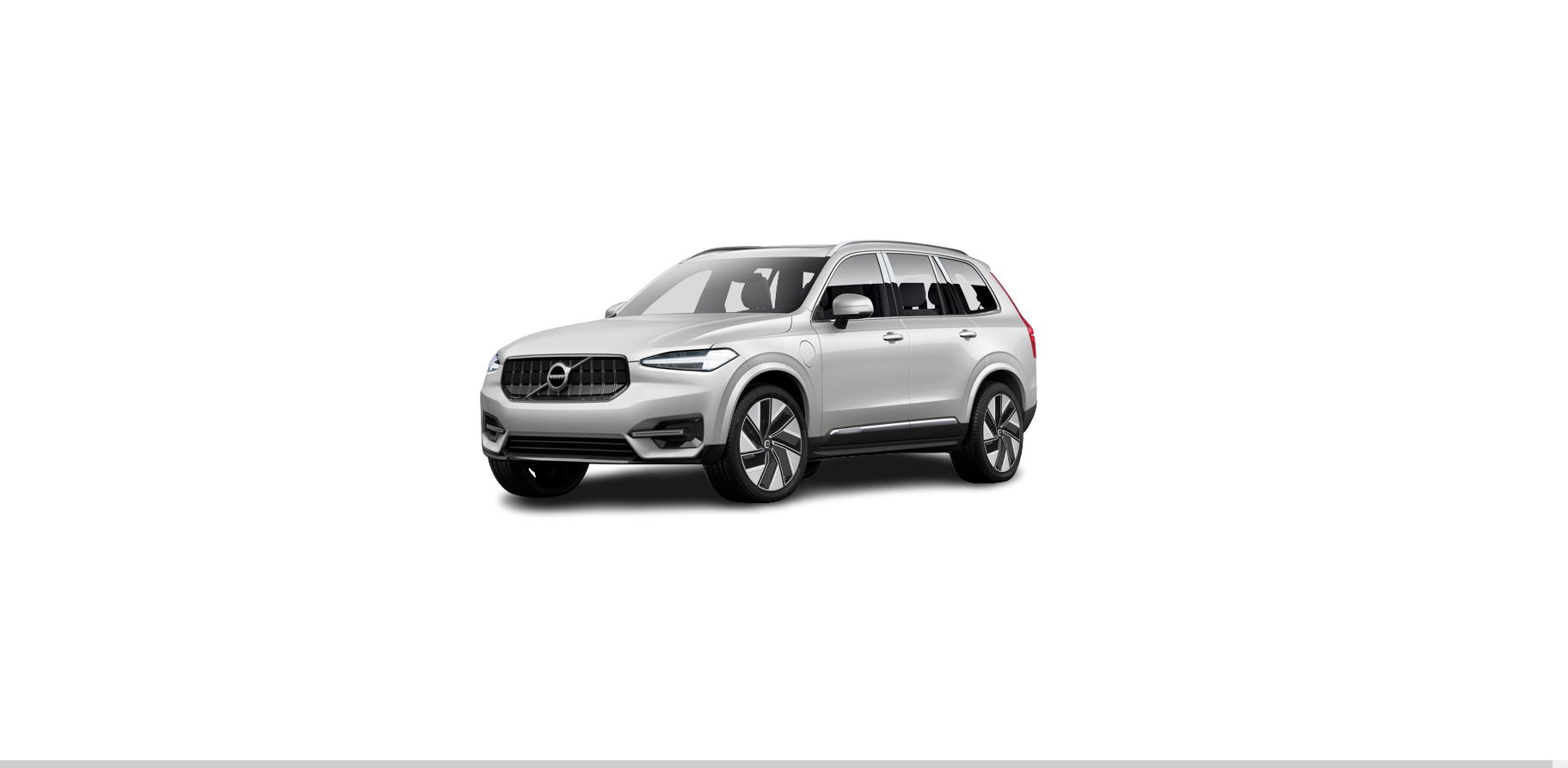2023 Volvo XC90 Camera and radar unit
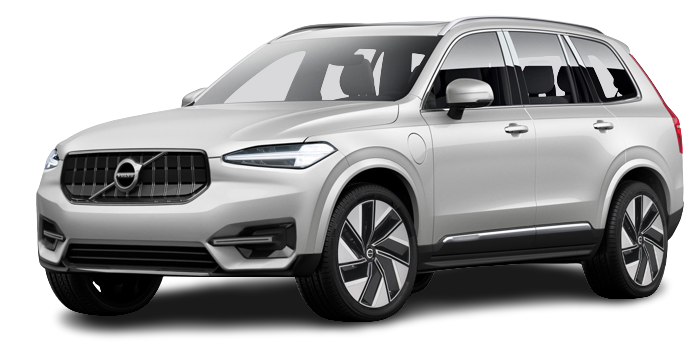
Recommended maintenance for camera, sensor and radar units
- Do not affix any objects, tape or decals in the areas described below.
- Clean camera lenses regularly with lukewarm water and car shampoo – be careful not to scratch the lenses.
- Avoid fitting auxiliary lamps or similar in the grille as this may affect the performance of the front radar unit.
- Use only Volvo genuine emblems in the grille in front of the front radar unit so as not to affect the function of the front radar unit.
Radar unit locations
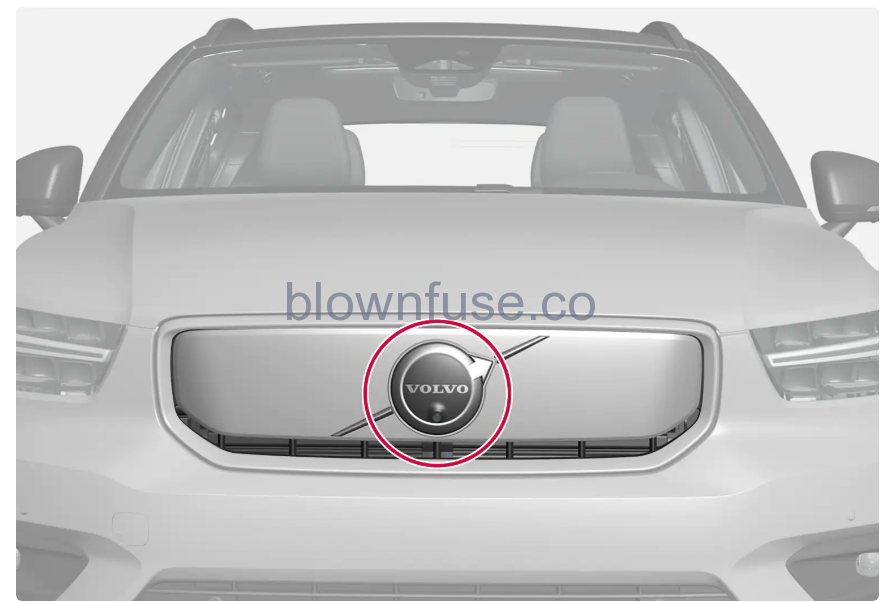
Location of front radar unit
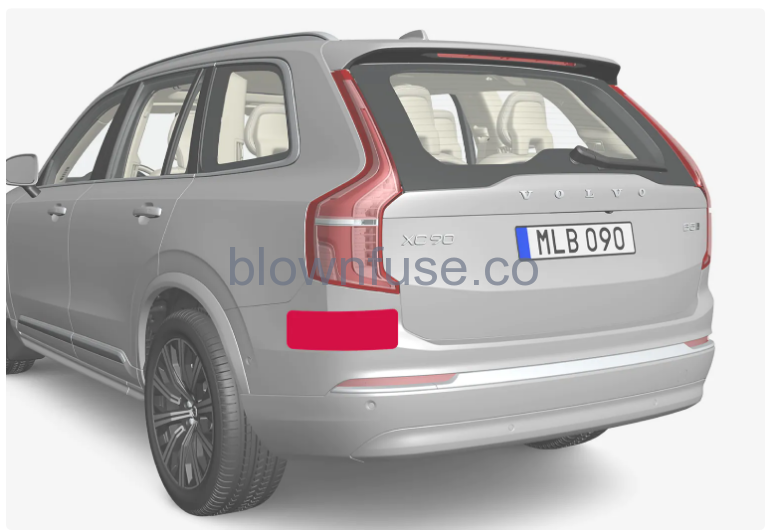
Location of rear radar units
Location of the parking sensors
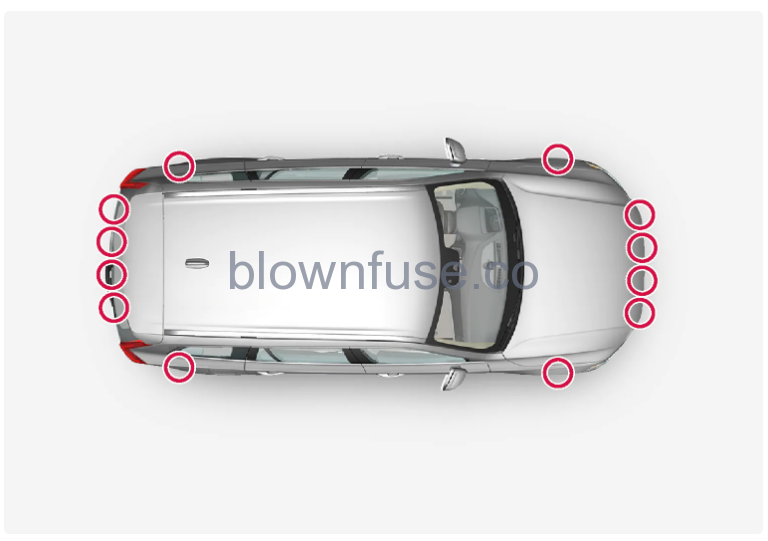
Location of the parking sensors around the car
Note
Dirt, ice and snow covering the sensors may cause incorrect warning signals, reduced or no function.
Camera location
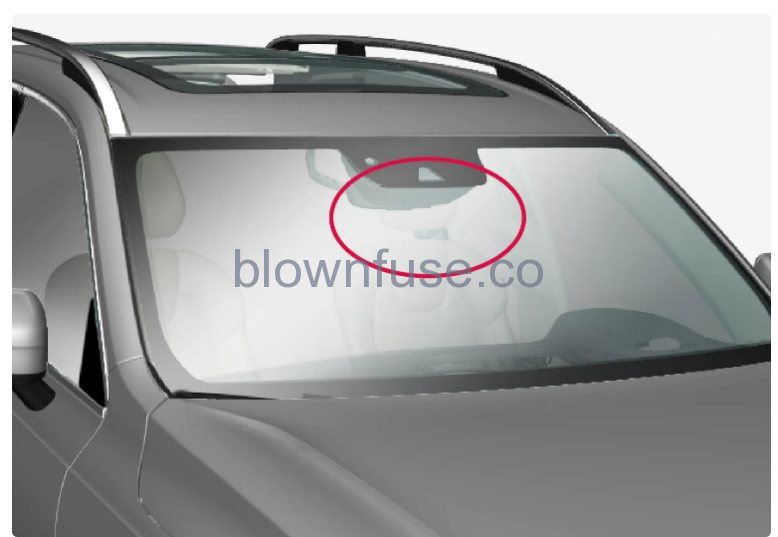
Location of front camera unit
Important
Maintenance of driver support components must only be performed at a workshop – an authorised Volvo workshop is recommended.
Symbols and messages for camera and radar units
Detector blocked

If the driver display shows this symbol and a message, this means that the camera and radar units cannot detect other vehicles, cyclists, pedestrians and large animals in front of the car, and that the car’s camera-based and radar-based functions may be disrupted.
The following table presents examples of possible causes for a message being shown, along with the appropriate action:
| Cause | Action |
|---|---|
| The surface area in front of the radar unit is dirty or covered with ice or snow. | Clean the surface area in front of the radar unit from dirt, ice and snow. |
| The windscreen surface in front of the camera unit is dirty or covered with ice or snow. | Clean dirt, ice and snow from the windscreen surface in front of the camera unit. |
| Thick fog and heavy rain or snow block the radar signals or the camera view. | No action. Sometimes the unit does not work during heavy rain or snowfall. |
| Water or snow from the road surface swirls up and blocks the radar signals or camera view. | No action. Sometimes the unit does not work on a very wet or snow-covered road surface. |
| Strong oncoming light | No action. The camera unit is reset automatically in more favourable light conditions. |
Limitations for camera and radar units
Common limitations for camera and radar
The camera and radar are aids for intelligent driving that cannot be called upon to achieve intelligent driving, and the necessary safety management must be implemented in order to avoid road safety risks or accidents caused by the driver’s incorrect use of the camera and radar.
Blocked unit
Do not position, stick or install anything in front of or around the camera and radar units – this may disrupt camera and radar-based functions. This may result functions being reduced, being switched off completely or giving incorrect function responses.
Damaged windscreen
The following rules are also applicable when a camera is fitted in the windscreen:
- If a scratch, crack or stone chip appears in front of the unit and covers an area of approx. 0.5 × 3.0 mm (0.02 × 0.12 inches) or more, a workshop (An authorised Volvo workshop is recommended) must be contacted so that the windscreen can be replaced.
- Volvo recommends not repairing cracks, scratches or stone chips in the area in front of the unit – the entire windscreen should be replaced instead.
- Before replacing a windscreen, contact a workshop(An authorised Volvo workshop is recommended) to verify that the correct windscreen has been ordered and will be fitted.
- The same type of windscreen wipers or windscreen wipers approved by Volvo must be fitted when the windscreen is replaced.
- When replacing the windscreen, the camera unit must be recalibrated by a workshop (An authorised Volvo workshop is recommended) to ensure the functionality of all the camera-based systems in the car.
Note
If not rectified, it can lead to reduced performance for the driver support systems that use the camera and/or radar units. This may result functions being reduced, being switched off completely or giving incorrect function responses.
Further limitations for radar
Vehicle speed
The radar unit’s ability to detect a vehicle ahead is greatly reduced if the speed of the vehicle ahead is very different to the speed of your own car.
Limited field of vision
The radar unit has a limited field of vision. In some situations another vehicle is not detected, or the detection is made later than expected.
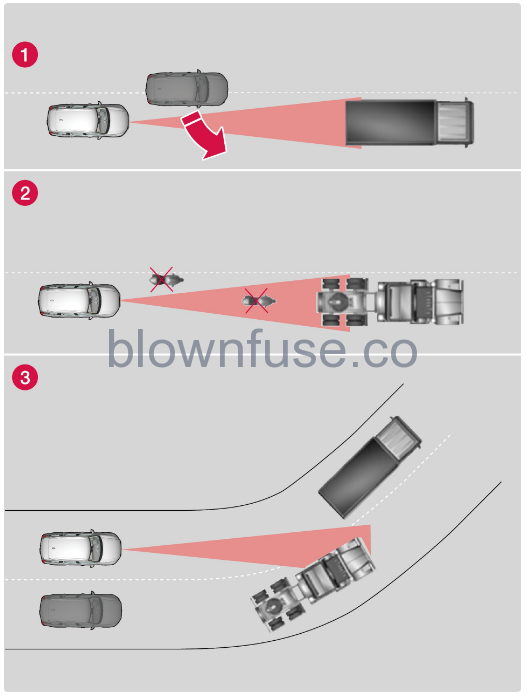
The radar unit’s field of vision
- Sometimes the radar unit is late at detecting vehicles at close distances – e.g. a vehicle that drives in between your car and the vehicle ahead.
- Small vehicles, such as motorcycles, or vehicles not driving in the centre of the lane can remain undetected.
- In bends, the radar unit may detect a different vehicle than intended or lose a detected vehicle from view.
Reduced function
In the event of heavy rain or slush or ice on the emblem, radar unit functions may be reduced, completely deactivated, or give incorrect function response.
Impaired vision
The cameras have limitations similar to the human eye, i.e. may “see” worse in for example intense snowfall or rain, dense fog, heavy dust storms and snow flurries. Under such conditions, the functions of camera-dependent systems could be significantly reduced or temporarily disengaged.
Strong oncoming light, reflections in the carriageway, snow or ice on the road surface, dirty road surfaces or unclear lane markings can also significantly reduce camera function when it is used to scan the carriageway to detect pedestrians, cyclists, large animals and other vehicles.
Bicycle racks or other accessories mounted at the rear of the car may obscure the camera’s view.
Further limitations for Park assist camera
Blind sectors
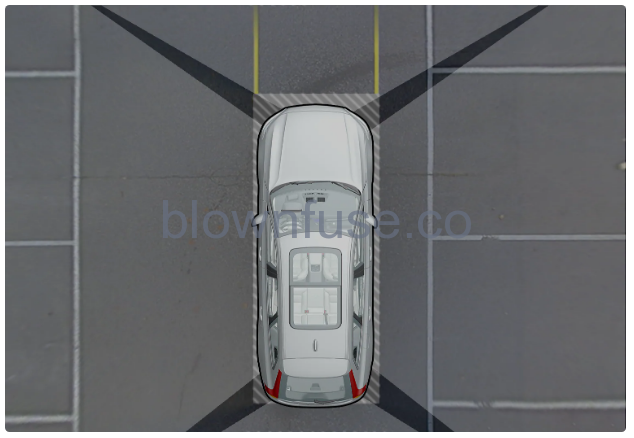
There are “blind” sectors between the cameras’ fields of vision.
In the park assist camera’s 360° view obstacles/objects may “vanish” in the gaps between the individual cameras.
Warning
Pay attention to the possibility that, even if it only looks like a relatively small part of the image is obscured, a relatively large sector could be hidden from view. An obstacle could thereby go undetected until the car is very close to it.
Light conditions
The camera image is adjusted automatically according to prevailing light conditions. Because of this, the image may vary slightly in brightness and quality. Poor light conditions can result in reduced image quality.
Camera unit
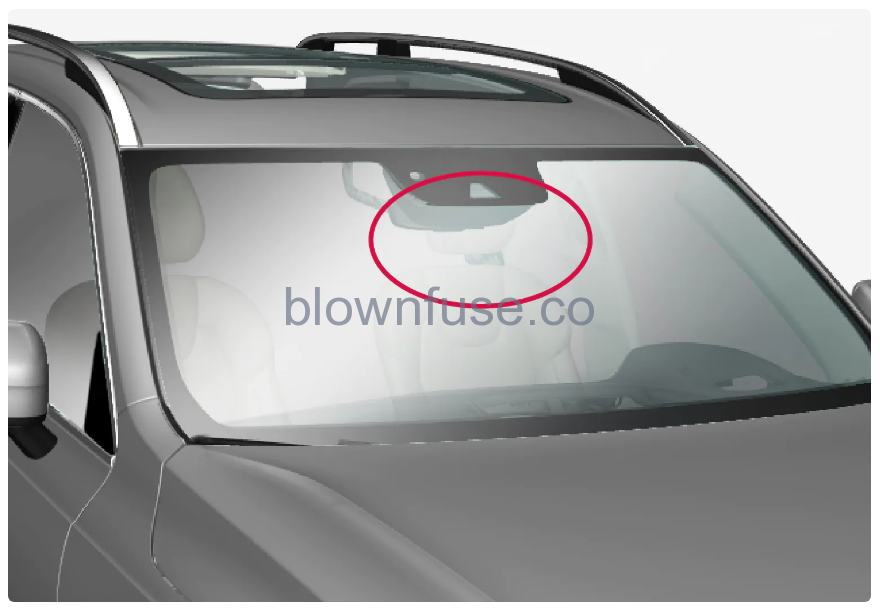
Location of the camera unit
The camera unit is used for the following functions:
- Pilot Assist(Option/accessory)
- Lane assistance(Option/accessory)
- Assistance at risk of collision
- Driver Alert(Option/accessory)
- Road Sign Information(Option/accessory)
- Active main beam(Option/accessory)
- Park Assist(Option/accessory)
- Ready to drive notification
Important
Do not attempt to access the camera using sharp or foreign objects through the air vents as this may damage the equipment.
Radar units
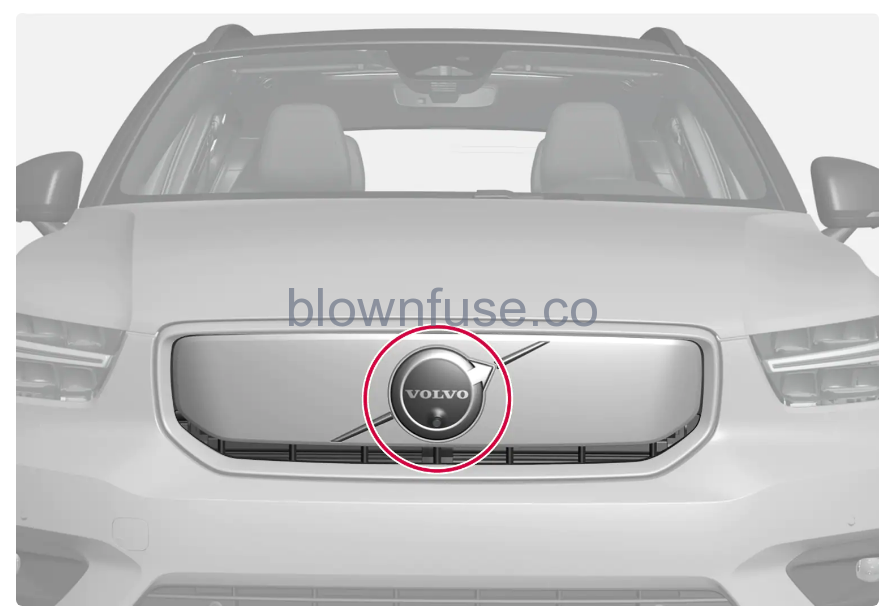
Location of front radar unit
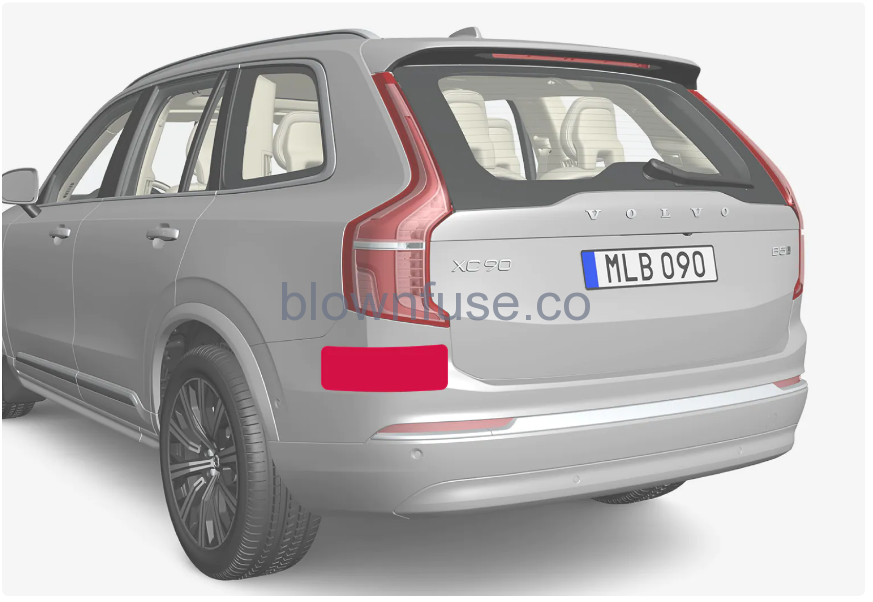
Location of rear radar units
Modifying radar units may make them illegal to use.
Avoid fitting auxiliary lamps or similar in front of the grille as this may affect radar unit functionality.
Use only Volvo genuine emblems in the grille in front of the front radar unit so as not to affect the function of the front radar unit.
Type approval for radar device
| Market | PA | BLIS | Symbol | Type approval |
|---|---|---|---|---|
| Botswana | ✓ |
 |
BOCRA/TA2019/4981 | |
| ✓ | BOCRA/TA/2017/3372 | |||
| Brazil | ✓ |
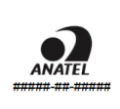 |
Este equipamento não tem direito à proteção contra interferência prejudicial e não pode causar interferência em sistemas devidamente autorizados.
06354-19-12386 |
|
| ✓ | Este equipamento não tem direito à proteção contra interferência prejudicial e não pode causar interferência em sistemas devidamente autorizados.
03563-17-05364 |
|||
| Europe | ✓ |
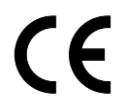 |
Hereby, Veoneer US, Inc. declares that the radio equipment type 77V12FLR is in compliance with Directive 2014/53/EU.
Operational frequency band: 76-77 GHz Maximum Output Power: <55dBm EIRP The full text of the EU declaration of conformity is available at the following internet address: https://www.veoneer.com/en/regulatory Manufacturer: Veoneer US, Inc. 26360 American Drive Southfield, MI 48034 USA Phone: +1-248-223-0600 |
|
| ✓ | Hereby, Hella KgaA Hueck & Co. Declares that the radio equipment type RS4 is in compliance with Directive 2014/53/EU.
The full text of the EU declaration of conformity is available at the following internet address: www.hella.com/vcc. Technical information: Frequency range: 24.05 … 24.25 GHz Transmission power: 20 dBm (maximum) EIRP Manufacturer and Address: Manufacturer: Hella KGaA Hueck & Co. Address: Rixbecker Straße 75, 59552 Lippstadt, Germany |
|||
| The United Arab Emirates (UAE) | ✓ |
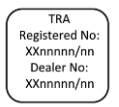 |
REGISTERED No: ER72325/19
DEALER No: 0020858/10 |
|
| ✓ | Registered No: ER53878/17
Dealer No: DA44932/15 |
|||
| Ghana | ✓ | NCA Approved: ZRO-1H-7E3-145 | ||
| ✓ | NCA Approved: 1R3-1M-7E1-0B7 | |||
| Indonesia | ✓ |
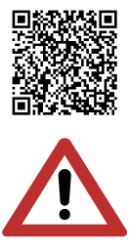 Dilarang melakukan perubahan spesifikasi yang dapat menimbulkan gangguan fisik dan/atau elektromagnetik terhadap lingkungan sekitarnya |
Certificate number: 81226/SDPPI/2022
13809 |
|
| ✓ |
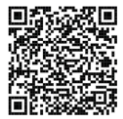 |
Certificate number: 79866/SDPPI/2022
13809 |
||
| Japan | ✓ |
 |
This device is granted pursuant to the Japanese Radio Law under the grant ID n° : R 215-JRA003 This device should not be modified (otherwise the granted designation number will become invalid).
|
|
| ✓ | This device is granted pursuant to the Japanese Radio Law under the grant ID n° : R 204-750001 This device should not be modified (otherwise the granted designation number will become invalid).
|
|||
| China | ✓ | |||
| Malaysia | ✓ |
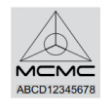 |
HIDF15000171
Model: 77V12FLR Brand: Veoneer US, Inc. |
|
| ✓ | CID F 15000578 | |||
| Morocco | ✓ | AGREE PAR L’ANRT MAROC
Numéro d´agrément: MR_20098_ANRT_2019 Date d´agrément: 2019_06_14 |
||
| Mexico | ✓ | IFT: RLVVE7719-1064
La operación de este equipo está sujeta a las siguientes dos condiciones: (1) es posible que este equipo o dispositivo no cause interferencia perjudicial y (2) este equipo o dispositivo debe aceptar cualquier interferencia, incluyendo la que pueda causar su operación no deseada. |
||
| ✓ | Radar de corto alcance
RS4 Hella KGaA Hueck & Co IFETEL: RLVHERS17-0286 La operación de este equipo esta sujeta a las siguientes dos condiciones: (1) es posible que este equipo o dispositivo no cause interferencia perjudicial y (2) este equipo o dispositivo debe aceptar cualquier interferencia, incluyendo la que pueda causar su operación no deseada. |
|||
| Moldova | ✓ | ✓ |
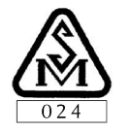 |
|
| Nigeria | ✓ | ✓ | Connection and use of this communications equipment is permitted by the Nigerian Communications Commission. | |
| Oman | ✓ |
 |
Registered No: R/7713/19
Dealer No: D172338 |
|
| ✓ | Registered No: R/3957/17
Dealer No: D080134 |
|||
| Paraguay | ✓ |
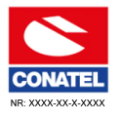 |
NR: 2019-07-I-0397 | |
| Serbia | ✓ |
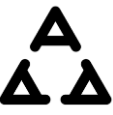 |
И011 19 | |
| ✓ | И011 17 | |||
| Singapore | ✓ |
 |
DA 106706 | |
| ✓ | DA 103238 | |||
| UK | ✓ |
 |
Hereby, Veoneer US, Inc. declares that the radio equipment type 77V12FLR is in compliance with radio regulation 2017.
Operational frequency band: 76 – 77 GHz/ Maximum output power: < 55 dBm e.i.r.p |
|
| ✓ | Hereby, Hella GmbH & Co. KGaA declares that the radio equipment type RS4 is in compliance with Radio Equipment Regulations of the United Kingdom.
The full text of the United Kingdom declaration of conformity is available at the following internet address:www.hella.com/vcc Technical information: Frequency band: 24.05 … 24.25 GHz Transmission power: 20 dBm (max.) EIRP Manufacturer and Address: Hella GmbH & Co. KGaA Rixbecker Straße 75, 59552 Lippstadt, Germany |
|||
| South Africa | ✓ |
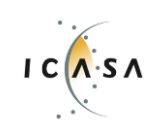 |
TA-2019/1378APPROVED | |
| ✓ | TA-2016/3407APPROVED | |||
| South Korea | ✓ |
 |
R-C-1VN-77V12FLR | |
| ✓ | R-CMM-HLA-RS4
|
|||
| Taiwan | ✓ |
 |
||
| ✓ | ||||
| Thailand | ✓ | ✓ | ||
| Ukraine | ✓ |
 |
||
| ✓ | ||||
| Vietnam | ✓ |
 |
77V12FLR | |
| ✓ | C0173191017AF04A2 | |||
| Zambia | ✓ |
 |
ZMB/ZICTA/TA/2019/6/61 | |
| ✓ | ZMB/ZICTA/TA/2017/6/7 |
For detailed information on type approval, go to volvocars.com/intl/support.
